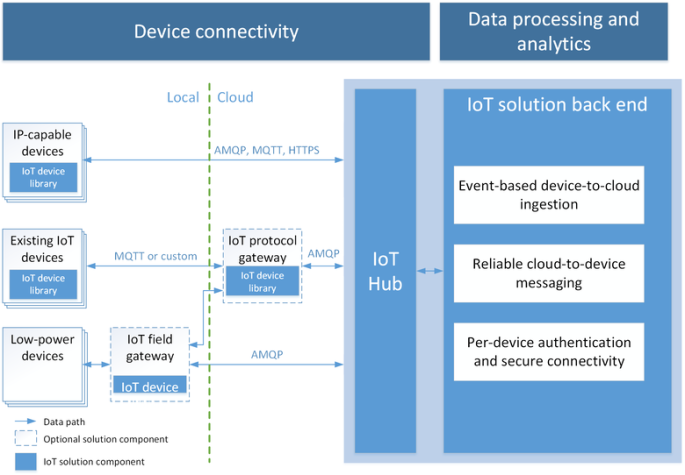Azure IOT Hub is the ingestion platform for million of IOT devices.
Azure IOT Hub is a fully managed service that provides reliable and secure bidirectional communications between IOT devices and a solution back end.
The IoT device here is intelligent device and is IP capable. If not then gateways will be used to connect IoT Device to IoT Hub.
You can use standard and custom protocols, including HTTPS, Advanced Message Queuing Protocol (AMQP) and MQ Telemetry Transport (MQTT) to connect with IOT Hub.
Azure IOT Hub Architecture
The following diagram shows a typical IoT solution architecture.
In this architecture, IoT devices collect data that they send to a cloud gateway. The cloud gateway makes the data available for processing by other back-end services from where data is delivered to other line-of-business applications or to human operators through a dashboard or other presentation device.

Azure IOT Gateways
Gateway act as intermediaries between your devices and your IOT hub.
A gateway in an IOT solution is typically either a protocol gateway that is deployed in the cloud or a field gateway that is deployed locally with your devices.
Protocol Gateway: A protocol gateway performs protocol translation, for example MQTT to AMQP and is deployed in Cloud.
Field Gateway: A field gateway can run analytics on the edge, make time-sensitive decisions to reduce latency, provide device management services, enforce security and privacy constraints, and also perform protocol translation.
Note that IOT devices can connect directly to IoT Hub. Gateways are required if IoT device is not IP capable or you require some intelligent services to run on the edge. Gateways can also be used wherein multiple IoT decices can send data to Gateway and Gateway in turn sends the aggregate data to IOT Hub.
IOT Solution Backend working and components
Most of the data processing such as filtering and aggregating IoT device telemetry data and routing it to other services occurs in IoT Solution backend. It also Provides device registration capabilities that enable you to provision devices and to control which devices are permitted to connect to your infrastructure.
Azure Stream Analytics: Azure Stream Analytics provides in-motion data analysis. Stream Analytics process the messages from devices and deliver those messages to other services.
Azure Blob Storage & Cosmos DB: They provide the data storage capabilities. Blob storage is used to store telemetry and to make it available for analysis. Cosmos DB store device metadata and enable the device management capabilities.
Azure Web Apps and Power BI: Web App runs the web application server and integrates with Azure Stream Analytics, Azure Blob Storage & Cosmos DB in backend. It also provides frontend user interface for users to interact with IoT platform.
Microsoft also bundles all of the above components and Azure IOT hub in Azure IoT suite.
Azure IOT Hub Pricing
IoT Hub is offered in four editions: Free, S1, S2 and S3.
| Edition Type | Price/Unit/Month | Messages/Day/Unit | Messages Size |
| Free | Free | 8,000 | 0.5 KB |
| S1 | $50 | 4,00,000 | 4 KB |
| S2 | $500 | 60,00,000 | 4 KB |
| S3 | $5000 | 3000,00,000 | 4 KB |
Blog Post on Azure Study & Lab Guide for 70-535 Exam
Architecting MS Azure Solutions Study & Lab Guide 70-535
Latest Blog Post
Most Popular Blog Posts
Hands on Lab – Video on Demand (VOD) Streaming using Azure Media Services (AMS)
Virtual Machine Scale Set (VMSS)
Blog Posts on Azure Lab Guide
MCSA Cloud Infrastructure Lab Guide 70-534 Exam
MCSA Cloud Infrastructure Lab Guide 70-534 Exam listed as Best Seller on Amazon
Other Popular Blog Posts
Mini Design Example – Layer 4 Load Balancer or Layer 7 Load Balancer
Mini Design Scenario Excerpt: Identity Management
Azure Active Directory Privileged Identity Management
Azure SQL Database Threat Detection & Auditing
